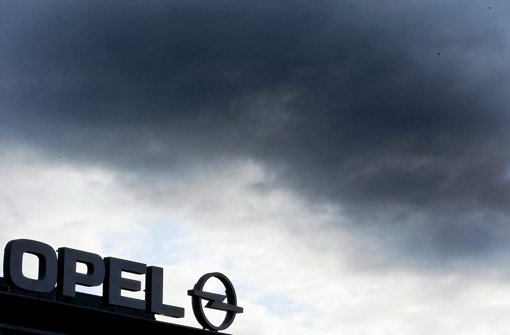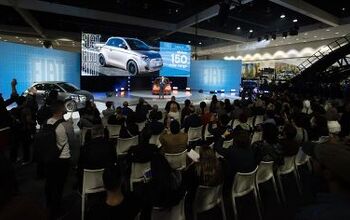GM Closes Bochum, Opens Itself To Costly Fight Over Severance Pay

Opel’s Supervisory Board, with half of its members delegates of the labor union, decided today the first closure of a German car factory in decades. According to Reuters, “Opel will end producing Zafira MPVs at its 50-year old Bochum plant by the end of next year, a move that has triggered a rare and public split within union ranks following months of tough negotiations.”
The closure will lead to the loss of 3,000 jobs in Bochum, as part of Opel’s attempt to put an end to 15 straight years of losses in Europe. It will be a while.
The Bochum plant makes the Zafira, and the current model will be produced through 2016. Where that will happen after 2014 is anybody’s guess. Opel’s works council in Bochum was betting that GM would not want to shift production before the model change and voted against a compromise deal that would have kept the plant running through the end of the model’s life-cycle. Workers in other Opel plants supported the deal that had been worked out between unions and management.
According to Reuters, “labor leaders in Bochum, a former coal mining town in the economically depressed Ruhr region, believe colleagues at Opel’s other three German plants were all too willing to sacrifice Bochum in order to save their own factories.”
The board decision was pre-ordained. According to German rules, if the board is split, the Chairman can cast a tie-breaker vote. The Chairman of Opel’s Supervisory Board is Steve Girsky. By casting two votes, he sealed the fate of the Bochum factory.
However, Girsky’s tough line will become very costly for GM. Under normal circumstances, closing a European plant even with the cooperation of the unions does not come cheap. As the examples of Antwerp and Genk show, average severance payments of $200,000 and higher are normal, depending on the age of the workforce. “There won’t be a deal for less than $200,000 per head,” the CEO of a company in the region told Wirtschaftswoche.
In the case of Bochum, the works council opposes the closure, which could mean a drawn-out and costly legal battle and even higher severance payments. Works council chief Walter Einenkel; already threatened “a multi-year, politically and financially expensive affair, which will dominate the public discussion for years to come,” and damage the Opel brand even more.
It will be a very long time until the savings from closing Opel will be realized. Or, as Einenkel predicted, “for Opel the most expensive closure of all times.”
There is one way around it: Bankruptcy. Opel AG is a standalone company that just happens to be majority-owned by GM. If someone issues a Do Not Resuscitate order and takes Opel off GM’s money drip, bankruptcy would follow in due course. Word has gotten around in Europe that there is too much capacity, and shedding it via a GM-owned Opel would not be entirely unwelcome. Except among the Opel workers.

Bertel Schmitt comes back to journalism after taking a 35 year break in advertising and marketing. He ran and owned advertising agencies in Duesseldorf, Germany, and New York City. Volkswagen A.G. was Bertel's most important corporate account. Schmitt's advertising and marketing career touched many corners of the industry with a special focus on automotive products and services. Since 2004, he lives in Japan and China with his wife <a href="http://www.tomokoandbertel.com"> Tomoko </a>. Bertel Schmitt is a founding board member of the <a href="http://www.offshoresuperseries.com"> Offshore Super Series </a>, an American offshore powerboat racing organization. He is co-owner of the racing team Typhoon.
More by Bertel Schmitt
Latest Car Reviews
Read moreLatest Product Reviews
Read moreRecent Comments
- SCE to AUX Range only matters if you need more of it - just like towing capacity in trucks.I have a short-range EV and still manage to put 1000 miles/month on it, because the car is perfectly suited to my use case.There is no such thing as one-size-fits all with vehicles.
- Doug brockman There will be many many people living in apartments without dedicated charging facilities in future who will need personal vehicles to get to work and school and for whom mass transit will be an annoying inconvenience
- Jeff Self driving cars are not ready for prime time.
- Lichtronamo Watch as the non-us based automakers shift more production to Mexico in the future.
- 28-Cars-Later " Electrek recently dug around in Tesla’s online parts catalog and found that the windshield costs a whopping $1,900 to replace.To be fair, that’s around what a Mercedes S-Class or Rivian windshield costs, but the Tesla’s glass is unique because of its shape. It’s also worth noting that most insurance plans have glass replacement options that can make the repair a low- or zero-cost issue. "Now I understand why my insurance is so high despite no claims for years and about 7,500 annual miles between three cars.


































Comments
Join the conversation
It blows my mind how a company can lose money for 15 years and have the European governments and the unions prevent the company from closing factories or eliminating workers. The governments and the unions deserve an Opel bankruptcy. The issue in this process for GM is being able to transfer the technology rights from Opel to GM as well as any resulting public relations backlash against their products. On the latter point however, what do they really have to lose (besides more money)?
One of best attributes of co-determination and strong unions is that things like massive severance paskages and such the German companies learned to plan ahead usually ten years or more and made hiring decisions based on those plans vs. living Quarer to Quater (US and Britian come to mind. Additionally co-determination makes the unions true stake holders, and having half of the board they can't live in denial, they know the true financial situations of the companies, when to take and when to give, imagine this leads to much greater pride as they are considered to be, if not the most important part of the company, they're considered to be equal in its success vs. being treated like a disposable asset who's only real value is enriching executives and stockolders. Another significant difference is that German management understand that to much money is to much and instead of taking $100 million for themselves, the regular employees receive significant profit sharing (or perks depending on taxes again) and that its better to invest windfall profits into the infrastructure, technologies, innovations and growth for the long term (See VW for how this stragegy plays out) vs. stuffing thier pockets in the short term. Imagine what american industry would be today if we could have lived by those simple concepts.